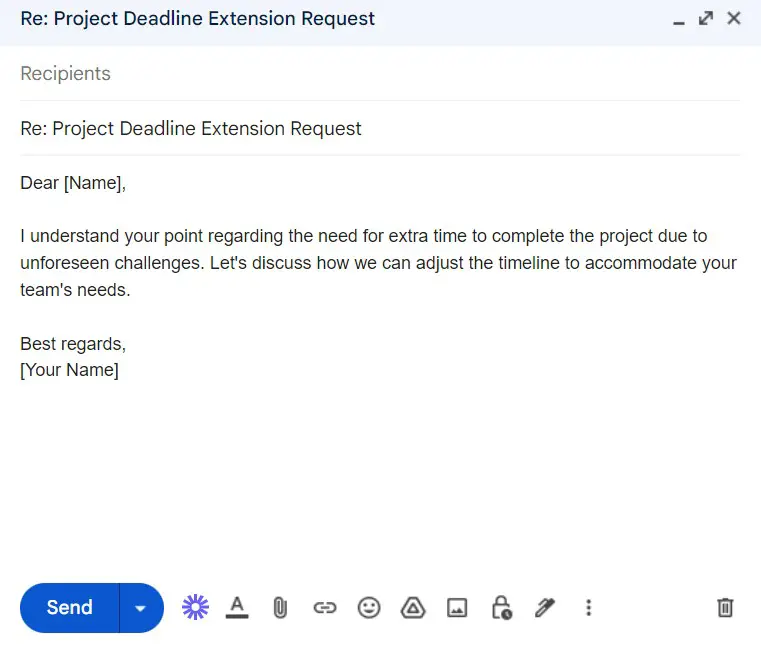Effective communication is crucial in the digital age, and mastering the art of expressing understanding in emails can help build strong relationships.
In this article, we will explore how to use the phrase “I understand your point” in an email, provide ten examples of its usage, and suggest alternative ways of conveying the same message.
Contents
- How to Use the Phrase “I Understand Your Point” in an Email
- “I Understand Your Point” Email Samples
- Example 1 – Subject: Re: Project Deadline Extension Request
- Example 2 – Subject: Re: Budget Proposal Concerns
- Example 3 – Subject: Re: Meeting Schedule Conflict
- Example 4 – Subject: Re: Software Upgrade Recommendation
- Example 5 – Subject: Re: Office Space Reorganization
- Example 6 – Subject: Re: Team Building Activity Suggestions
- Example 7 – Subject: Re: Client Feedback
- Example 8 – Subject: Re: Vacation Request
- Example 9 – Subject: Re: Policy Update Feedback
- Example 10 – Subject: Re: Event Sponsorship Inquiry
- Alternative Ways of Saying “I Understand Your Point” in an Email
How to Use the Phrase “I Understand Your Point” in an Email
Using “I understand your point” in an email shows empathy and demonstrates that you have carefully considered the sender’s perspective.
To effectively use this phrase, place it in the context of the sender’s statement, followed by your response or proposed solution.
This way, the sender will feel valued and heard, fostering an atmosphere of mutual respect and cooperation.
“I Understand Your Point” Email Samples
Example 1 – Subject: Re: Project Deadline Extension Request
Dear [Name],
I understand your point regarding the need for extra time to complete the project due to unforeseen challenges. Let’s discuss how we can adjust the timeline to accommodate your team’s needs.
Best regards,
[Your Name]
Example 2 – Subject: Re: Budget Proposal Concerns
Hello [Name],
I understand your point about the potential risks of overspending on marketing. I’ll revise the budget proposal to allocate resources more effectively.
Kind regards,
[Your Name]
Example 3 – Subject: Re: Meeting Schedule Conflict
Hi [Name],
I understand your point that the proposed meeting time doesn’t suit everyone. I’ll send out a new poll to find a time that works better for all.
Cheers,
[Your Name]
Example 4 – Subject: Re: Software Upgrade Recommendation
Dear [Name],
I understand your point about the benefits of upgrading our software. Let’s set up a meeting to discuss the costs and implementation process.
Sincerely,
[Your Name]
Example 5 – Subject: Re: Office Space Reorganization
Hello [Name],
I understand your point about the need for more collaborative spaces. I’ll work with the facilities team to explore possible solutions.
Warm regards,
[Your Name]
Example 6 – Subject: Re: Team Building Activity Suggestions
Hi [Name],
I understand your point that not everyone enjoys outdoor activities. Let’s consider a mix of indoor and outdoor team building events to cater to everyone’s preferences.
Take care,
[Your Name]
Example 7 – Subject: Re: Client Feedback
Dear [Name],
I understand your point about the client’s concerns. I’ll address their feedback and ensure we improve our services moving forward.
Best wishes,
[Your Name]
Example 8 – Subject: Re: Vacation Request
Hello [Name],
I understand your point about needing time off to recharge. Your vacation request has been approved, and we’ll ensure that your tasks are covered while you’re away.
Enjoy your break,
[Your Name]
Example 9 – Subject: Re: Policy Update Feedback
Hi [Name],
I understand your point about the potential negative impact of the new policy. I’ll share your concerns with the management team for further discussion.
Many thanks,
[Your Name]
Example 10 – Subject: Re: Event Sponsorship Inquiry
Dear [Name],
I understand your point about the potential benefits of sponsoring the event. Let’s set up a call to discuss the details and see if it aligns with our company’s objectives.
Best,
[Your Name]
Alternative Ways of Saying “I Understand Your Point” in an Email
- I see where you’re coming from.
- I appreciate your perspective.
- Your viewpoint makes sense.
- I can see your reasoning.
- I comprehend your thoughts on this matter.
- I grasp the concept you’re presenting.
- I get what you’re saying.
- Your point of view is clear to me.
- I acknowledge your standpoint.
- I can relate to your position on this issue.
In conclusion, effectively expressing understanding in emails is crucial for maintaining strong communication and fostering positive relationships.
Using the phrase “I understand your point” and its alternatives can demonstrate empathy and encourage an atmosphere of mutual respect.
Practice incorporating these phrases into your emails to improve your communication skills and enhance your professional relationships.


